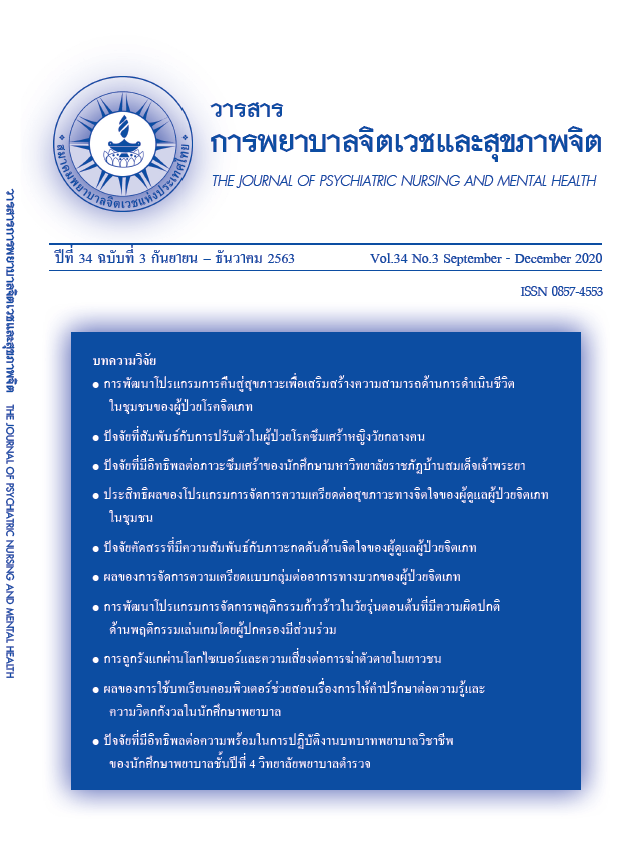การพัฒนาโปรแกรมการจัดการพฤติกรรมก้าวร้าวในวัยรุ่นตอนต้นที่มีความผิดปกติด้านพฤติกรรมเล่นเกมโดยผู้ปกครองมีส่วนร่วม
Main Article Content
บทคัดย่อ
วัตถุประสงค์: 1) เพื่อพัฒนาโปรแกรมการจัดการพฤติกรรมก้าวร้าวโดยผู้ปกครองมีส่วนร่วม สำหรับวัยรุ่นตอนต้นที่มีความผิดปกติพฤติกรรมเล่นเกม 2) เพื่อเปรียบเทียบคะแนนความก้าวร้าวระหว่างกลุ่มที่เข้าร่วมโปรแกรมฯ กับกลุ่มที่ได้รับการพยาบาลตามปกติ
วิธีการศึกษา: การวิจัยและพัฒนา (Research & Development; R&D) นี้ใช้แนวทางของ van Meijel และคณะ (2004) 5 ขั้นตอน โดยกลุ่มตัวอย่างคือ วัยรุ่นตอนต้นที่มีความผิดปกติพฤติกรรมเล่นเกม จำนวน 60 คน พร้อมผู้ปกครอง แบ่งเป็นกลุ่มที่เข้าร่วมโปรแกรมฯ และกลุ่มที่ได้รับการพยาบาลแบบปกติ โปรแกรมการจัดการพฤติกรรมก้าวร้าวพัฒนาจากแนวคิดของ Gross (1998) วิเคราะห์ข้อมูลด้วยความแปรปรวนสองทางแบบวัดซ้ำ
ผลการศึกษา: ผลการประเมินการยอมรับและความเป็นไปได้ที่จะนำโปรแกรมการจัดการพฤติกรรมก้าวร้าวไปใช้อยู่ในระดับดีมาก ผลลัพธ์จากการทดสอบโปรแกรมฯ พบว่า คะแนนพฤติกรรมก้าวร้าวของกลุ่มทดลองภายหลังสิ้นสุดโปรแกรมฯ น้อยกว่ากลุ่มควบคุมที่ได้รับการพยาบาลแบบปกติ
(F = 13.511 p < .01) เช่นเดียวกับคะแนนพฤติกรรมก้าวร้าวของกลุ่มทดลอง ระยะติดตามผล 1 เดือน และ 3 เดือนหลังสิ้นสุดโปรแกรมฯ น้อยกว่ากว่าก่อนเข้าร่วมโปรแกรม (F = 65.707, p < .001) อย่างมีนัยสำคัญทางสถิติ
สรุป: การพัฒนาโปรแกรมการจัดการพฤติกรรมก้าวร้าวในวัยรุ่นตอนต้นที่มีความผิดปกติพฤติกรรมเล่นเกมโดยผู้ปกครองมีส่วนร่วม ได้รับการยอมรับและประเมินแล้วว่าสามารถนำไปใช้ลดความก้าวร้าวและส่งเสริมสุขภาวะของวัยรุ่นตอนต้นที่มีความผิดปกติพฤติกรรมเล่นเกมได้จริง
Article Details
บทความที่ได้รับการตีพิมพ์แล้ว เป็นลิขสิทธิ์ของสมาคมพยาบาลจิตเวชแห่งประเทศไทย
เอกสารอ้างอิง
กัญญาวีร์ บุญเสนันท์. (2554). ผลของพฤติกรรมบำบัดพฤติกรรมก้าวร้าวของเด็กสมาธิสั้น. วิทยานิพนธ์พยาบาลศาสตรมหาบัณฑิต, คณะพยาบาลศาสตร์, จุฬาลงกรณ์มหาวิทยาลัย.
ขวัญจิต เพ็งแป้น. (2560). การป้องกันปัญหาภาวะสุขภาพของเด็กติดเกมออนไลน์. วารสารราชธานีนวัตกรรมทางวิทยาศาสตร์สุขภาพ, 1(1), 16-30.
จารุวรรณ ลิ้มไพบูลย์, ปาหนัน พิชยภิญโญ, และสุรินธร กลัมพากร. (2554). ผลของโปรแกรมลดพฤติกรรมก้าวร้าวในวัยรุ่นตอนต้น. วารสารสุขภาพจิตแห่งประเทศไทย, 19(1), 160-170.
พิกุลทอง กัลยา และจินตนา ยูนิพันธ์. (2559). ผลของโปรแกรมการจัดการพฤติกรรมก้าวร้าวในเด็กสมาธิสั้น. วิทยานิพนธ์พยาบาลศาสตรมหาบัณฑิต, คณะพยาบาลศาสตร์, จุฬาลงกรณ์มหาวิทยาลัย.
วรุณา กลกิจโกวินท์, ชัยพร วิศิษฎ์พงศ์อารีย์, พิสาส์น เตชะเกษม, ชาญวิทย์ พรนภดล, และบุษบา ศุภวัฒน์ธนบดี. (2558). การติดเกมส์คอมพิวเตอร์ ปัจจัยเสี่ยงและปัจจัยป้องกันของเด็กนักเรียนในเขตดุสิตกรุงเทพมหานคร.วชิรเวชสาร, 9(3), 1-13.
สถาบันสุขภาพจิตและวัยรุ่น. บทวิเคราะห์งานวิจัยสถานการณ์เด็กติดเกม มิถุนายน 2556. สืบค้นเมื่อ 10 ต.ค. 2562, จาก https://new.smartteen.net/_admin/filedownloadlist/FM-441-1559223711.pdf
สุภาวดี เจริญวานิช. (2557). พฤติกรรมการติดเกม: ผลกระทบและการป้องกัน. วารสารวิทยาศาสตร์และเทคโนโลยี, 22(6), 871-879.
American Psychiatric Association (APA). (2013). Diagnostic and statistical manual of mental disorders (DSM-5®). American Psychiatric Pub. p. 796
Apisitwasana, N., Perngparn, U., & Cottler, L. B. (2018). Effectiveness of school-and family-based interventions to prevent gaming addiction among grades 4–5 students in Bangkok,Thailand. Psychology Research and Behavior Management, 11, 103-115.
Burns, N., & Grove, S. K. (2005). The practice of nursing research: conduct, critique, and utilization. 5thedn. Missouri: Elsevier.
Charoenwanit, S. (2015). Correlation between Violent Games and Aggressive Behaviors in Adolescents.Research Administration Division, Thammasat University.
Feindler, E. L., & Gerber, M. F. (2012). Youth anger management treatment for school violence prevention. In S. R. Jimerson & M. Furlong (Eds.), Handbook of school violence and school safety: From research to practice (p. 353–363). Lawrence Erlbaum Associates Publishers.
Greitemeyer, T., & Mügge, D. O. (2014). Video games do affect social outcomes: A meta-analytic review of the effects of violent and prosocial video game play. Personality and Social Psychology Bulletin, 40(5), 578-589.
Gross, J. J. (1998). Antecedent-and response-focused emotion regulation: divergent consequences for experience, expression, and physiology. Journal of Personality and Social Psychology, 74(1), 224- 37.
Gross, J. J., & Thompson, R. A. (2007). Emotion Regulation: Conceptual foundations, Handbook of emotion regulation. New York: Guilford.
Kazdin, A. E., Siegel, T. C., & Bass, D. (1992). Cognitive problem-solving skills training and parent management training in the treatment of antisocial behavior in children. Journal of Consulting and Clinical Psychology, 60(5), 733.
Kazdin, A. E. (2008). Parent management training: Treatment for oppositional, aggressive, and antisocial behavior in children and adolescents. Oxford University Press.
Keijsers, L. (2016). Parental monitoring and adolescent problem behaviors: How much do we really know?. International Journal of Behavioral Development, 40(3), 271-281.
Lee, J., Lee, S., Chun, J. W., Cho, H., Kim, D. J., & Jung, Y. C. (2015). Compromised prefrontal cognitive control over emotional interference in adolescents with internet gaming disorder. Cyberpsychology, Behavior, and Social Networking, 18(11), 661-668.
Mauss, I. B., Bunge, S. A., & Gross, J. J. (2007). Automatic emotion regulation. Social and Personality Psychology Compass, 1(1), 146-167.
Pornnoppadol, C., Ratta-apha, W., Chanpen, S., Wattananond, S., Dumrongrungruang, N., Thongchoi, K., & Vasupanrajit, A. (2018). A comparative study of psychosocial interventions for internet gaming disorder among adolescents aged 13–17 years. International Journal of Mental Health and Addiction, 1-17.
Roberton, T., Daffern, M., & Bucks, R. S. (2012). Emotion regulation and aggression. Aggression and Violent Behavior, 17(1), 72-82.
Sullivan, T. N., Helms, S. W., Kliewer, W., & Goodman, K. L. (2010). Associations between sadness and anger regulation coping, emotional expression, and physical and relational aggression among urban adolescents. Social Development, 19(1), 30-51.
van Meijel, V. B., Gamel, C., van Swieten-Duijfjes, B., & Grypdonck, M. H. F. (2004). The development of evidence based nursing interventions: methodological considerations. Journal of Advanced Nursing, 48(1), 84-92.
World Health Organization (WHO). (2018). Inclusion of “gaming disorder” in ICD-11. Geneva: World Health Organization, from https://www.who.int/news/item/14-09-2018-inclusion-of-gaming-disorder-in-icd-11
Yudofsky, S. C., Silver, J. M., Jackson, W., Endicott, J., & Williams, D. (1986). The Overt Aggression Scale for the objective rating of verbal and physical aggression. The American Journal of Psychiatry, 143(1), 35-39.
Yalom, I. D. (1995). The theory and practice of group psychotherapy. Basic books (AZ).


